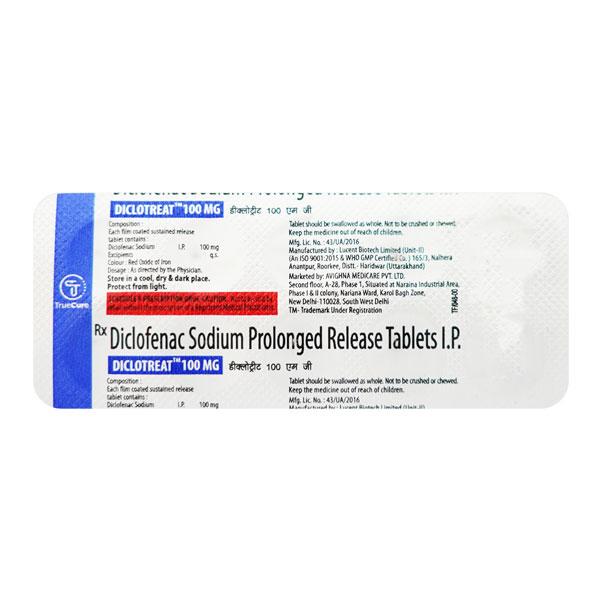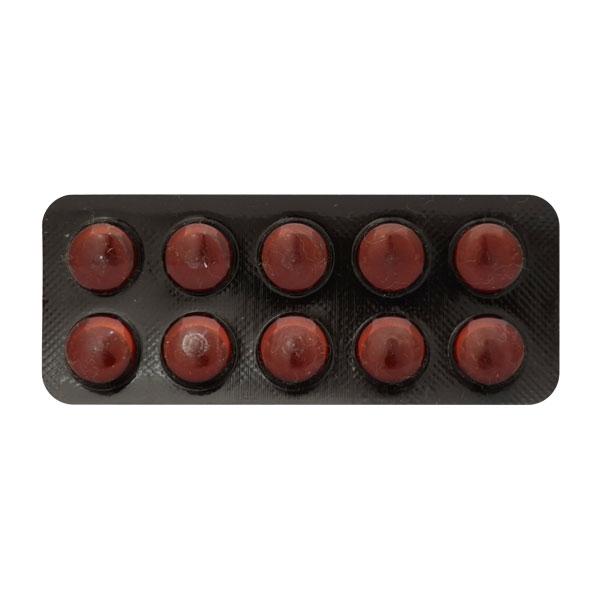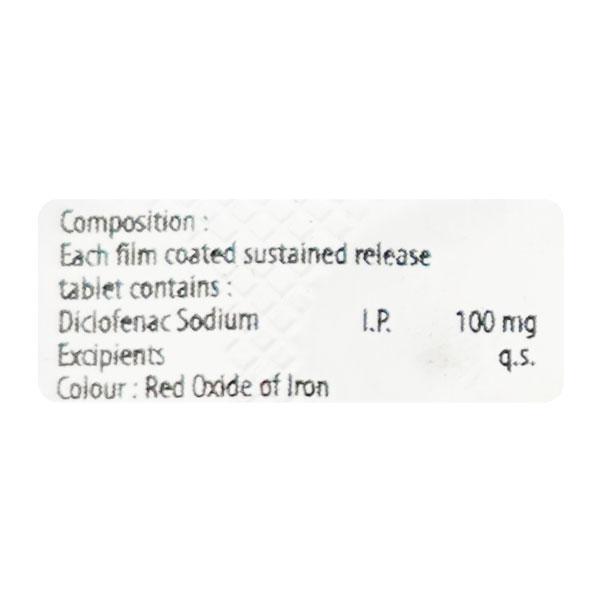

Netmeds First Membership
Quick Links
Introduction About DICLOTREAT 100 TABLET
DICLOTREAT 100 TABLET contains Diclofenac, which belongs to the group of medicines called Nonsteroidal Anti-Inflammatory Drugs (NSAIDs). It is used to manage pain and inflammation related to sprains, strains, and other injuries post-surgery, gout (excessive uric acid accumulation in joints), backache, rheumatoid arthritis (immune system attack on healthy cells by mistake, causing inflammation), osteoarthritis (flexible tissue at the ends of bones wears down), ankylosing spondylitis (spine inflammation), and pyrophosphate arthropathy (crystals of a calcium salt causing joint problems).
DICLOTREAT 100 TABLET can also be used in adults to manage symptoms associated with migraine attacks (one-sided headache that can cause severe throbbing pain or a pulsing sensation), frozen shoulder, fractures, dislocations, and conditions affecting tendons (Ex. tendonitis, tenosynovitis, bursitis). During DICLOTREAT 100 TABLET management, your doctor may want to give you a check-up regularly.
DICLOTREAT 100 TABLET is not recommended for use in patients with liver or kidney failure, heart problems like heart attack, stroke, or bypass, stomach ulcer, holes, or bleeding. Before taking DICLOTREAT 100 TABLET, inform your doctor if you have liver, kidney, heart, or bleeding problems, diabetes, asthma, or if you are going to have any surgery.
DICLOTREAT 100 TABLET is not recommended for use in pregnant (especially in the last 3 months) and breastfeeding women. DICLOTREAT 100 TABLET is not recommended for use in children (below 14 years of age), so consult your child’s doctor for advice.
The most common side effects of taking DICLOTREAT 100 TABLET are diarrhea, nausea, vomiting, headache, dizziness, skin rash, etc. Call your doctor if any of the symptoms worsen.
Uses Of DICLOTREAT 100 TABLET
DICLOTREAT 100 TABLET is used to manage pain and inflammation related to
- Sprains, strains, and other injuries, post-surgery, gout
- Backache, rheumatoid arthritis, osteoarthritis, ankylosing spondylitis, pyrophosphate arthropathy
- Frozen shoulder, fractures, dislocations, conditions affecting tendons
- Migraine attacks
How DICLOTREAT 100 TABLET Works
DICLOTREAT 100 TABLET relieves pain and inflammation by inhibiting certain enzymes (COX-1 and COX-2) involved in the synthesis of prostaglandins (chemicals responsible for inducing pain and inflammation).
How to use DICLOTREAT 100 TABLET
Take DICLOTREAT 100 TABLET as advised by your physician. Swallow DICLOTREAT 100 TABLET with a glass of water and do not chew or crush the medicine. Your doctor will decide a proper dose and duration for you depending upon your age, body weight, and disease condition.
Side Effects Of DICLOTREAT 100 TABLET
Common
- Loss of appetite, diarrhea
- Spinning sensation, dizziness, headache
- Spots or skin rash
- Raised blood levels of liver enzymes
Uncommon
- Fast or irregular heartbeat
- Heart problems like heart attack (swelling of feet or legs) or breathlessness
- Trouble breathing when lying down
- Chest pain
Rare
- Stomach ulcers or bleeding
- Gastritis (inflamed, irritated, or swollen stomach lining)
- Drowsiness, tiredness
- Blood in vomit or stools
- Black, tarry stools
- Fluid retention (swollen ankles)
- Asthma (wheezing, breathlessness, tight chest)
- Skin rash and itching
- Liver diseases, including hepatitis and jaundice
Stop taking DICLOTREAT 100 TABLET and contact your doctor immediately if you experience any of the following side effects:
- Heart attack (sudden and crushing chest pain)
- Early signs of stroke (sudden numbness or weakness in one side of the face, arm, or leg; sudden loss or vision disturbance; speech difficulty; migraine-like headache with or without disturbance in vision)
- Bleeding in stomach or intestine (bleeding while emptying your bowel, blood in vomit, black starry stools)
- Allergic reactions (skin rash, itching, bruising, painful red areas, peeling, or blister formation)
- Stomach pain, indigestion, nausea, vomiting, gas, heartburn
- Swelling in face, lips, hands, and fingers
- Yellowing of skin or eyeballs
- Persistent sore throat or high temperature
- Sudden change in amount and colour of urine
- Mild cramping and tenderness in stomach
- Stevens-Johnson syndrome (serious condition with blistering of skin, mouth, eyes, and genitals)
- Wheezing or shortness of breath
- Chest pain because of a serious allergic reaction called Kounis syndrome
- Easy bruising, frequent sore throats, or infections
- Weakness, slurry speech
How To Manage Side Effects
Diarrhea
Drink lots of fluids, such as water or fruit juice, so that you are sufficiently hydrated. If the diarrhea persists, contact your doctor.
Headache
Drink plenty of water and get adequate rest. Try to be relaxed and stress-free. Call your doctor before taking any medicine for a headache. If the headache persists, consult your doctor.
Indigestion
Keep your head and shoulders raised up while sleeping so that stomach acid won’t come up. Do not eat 3 to 4 hours before going to sleep and avoid tea, coffee, cola, or alcohol. If indigestion persists, contact your doctor.
Nausea And Vomiting
Stay hydrated with small sips of clear fluids like water, ginger ale, or electrolyte solutions. Avoid consuming large meals; instead, opt for bland, easy-to-digest foods. Ginger, peppermint, or chamomile tea may help soothe the stomach. Rest in a comfortable position, preferably with your head elevated, to ease symptoms. Consult your doctor if nausea and vomiting persist.
Skin rash Or Itching
Avoid hot showers, as they can further irritate your skin. Do not scratch the affected area. Use protective clothing when going outdoors. Regularly moisturize your skin. If the skin rash persists, contact your doctor.
Stomach Pain
Try to rest and relax. Eat and drink slowly or try to eat smaller meals in small breaks. Keep a heat pad on your stomach. If stomach pain persists, contact your doctor.
Warning & Precautions
Pregnancy
ContraindicatedDICLOTREAT 100 TABLET is not recommended for use in pregnancy (during the last 3 months). If you are pregnant, think you may be pregnant, or are planning for a baby, consult your doctor before taking it. Inform your doctor immediately if you become pregnant during management with DICLOTREAT 100 TABLET.
Breastfeeding
ContraindicatedDICLOTREAT 100 TABLET is not recommended for use in breastfeeding women. Consult your doctor before taking it.
Driving and Using Machines
ContraindicatedDo not drive or operate any heavy machines if you feel dizzy, tired, sleepy, or have problems with eyesight after taking DICLOTREAT 100 TABLET.
Alcohol
ContraindicatedAvoid consumption of alcohol while taking DICLOTREAT 100 TABLET, as it may increase the risk of GI bleeding. Consult your doctor for advice.
Kidney
Consult your doctorDICLOTREAT 100 TABLET is not recommended for use in patients with kidney failure. DICLOTREAT 100 TABLET should be used with caution in patients with other kidney problems. Consult your doctor for advice.
Liver
Consult your doctorDICLOTREAT 100 TABLET is not recommended for use in patients with liver failure. DICLOTREAT 100 TABLET should be used with caution in patients with other liver problems. Consult your doctor for advice.
Allergy
ContraindicatedDo not take DICLOTREAT 100 TABLET if you are allergic to Diclofenac, aspirin, ibuprofen, other NSAIDs, or any of the other ingredients of this medicine.
Lungs
Use with CautionDICLOTREAT 100 TABLET should be used with caution in patients with a history of asthma, seasonal allergic rhinitis, nasal polyps, chronic pulmonary disease, or respiratory tract infections. Consult your doctor for advice.
Heart Disease
Consult your doctorDICLOTREAT 100 TABLET is not recommended for use in patients with heart failure, heart diseases such as heart attack, blood circulation problems, blockage in blood vessels to the heart, and in patients who underwent operations to clear or bypass blockages. DICLOTREAT 100 TABLET should be used with caution in patients with angina (chest pain), high blood pressure, raised cholesterol or triglycerides, or other heart problems. Consult your doctor for advice.
Use In Pediatrics
ContraindicatedDICLOTREAT 100 TABLET is not recommended for use in children (below 14 years of age). Consult your child’s doctor for advice.
Use In Geriatrics
Use with CautionDICLOTREAT 100 TABLET should be used with caution in elderly patients. Consult your doctor for advice.
Others
DICLOTREAT 100 TABLET is not recommended for use if you:
- Have or had a stomach or intestinal ulcer, or bleeding in the gut
- Had stomach or bowel issues after taking other NSAIDs
- Have cerebrovascular disease like stroke or blockages in blood vessels to the brain
Before taking DICLOTREAT 100 TABLET, inform your doctor if you:
- Have porphyria (a rare genetic condition)
- Have any blood or bleeding disorder
- Have blood clots
- Have smoking habit
- Have diabetes
- Have systemic Lupus Erythematosus (an autoimmune condition causing joint pain and inflammation, fever, or skin rashes)
- Had undergone or are going to have any gut surgery
- Have stomach or bowel problems like ulcerative colitis or Crohn’s disease
Interactions
A. Drug-Drug Interactions:
Before taking DICLOTREAT 100 TABLET, inform your doctor if you are taking any of the following medicines:
- Medicines used to manage diabetes (Ex. metformin, gliclazide)
- Warfarin (used to dissolve blood clots)
- Medicines used to remove excess water from the body (Ex. spironolactone, furosemide)
- Methotrexate (used in cancer management)
- Lithium (used for mental health problems)
- Medicines used to suppress immunity (Ex. ciclosporin, tacrolimus)
- Medicines used for bacterial infections (Ex. trimethoprim, ofloxacin, ciprofloxacin)
- Other medicines used for pain relief (Ex. aspirin, ibuprofen)
- Mifepristone (used to terminate pregnancy)
- Medicines used to manage high blood pressure and other heart problems (Ex. captopril, atenolol, metoprolol, digoxin)
- Medicines used to suppress inflammation (Ex. prednisolone, hydrocortisone)
- Medicines used in depression (Ex. citalopram, fluoxetine)
- Phenytoin (used to manage fits)
- Voriconazole (used to manage fungal infections)
- Medicines used to lower cholesterol (Ex. colestipol, cholestyramine)
- Sulfinpyrazone (used in gout management)
- Zidovudine (used in HIV management)
Overdosage:
If you or anyone else accidentally takes too much of DICLOTREAT 100 TABLET, consult your doctor immediately or visit the nearby hospital. Symptoms of DICLOTREAT 100 TABLET overdose are headache, nausea, vomiting, stomach pain, and stomach or intestinal bleeding.
Synopsis
| Drug | : | Diclofenac |
| Pharmacological Category | : | Cyclooxygenase Inhibitors |
| Therapeutic Indication | : | Pain relief |
| Dosage Forms | : | Tablet, Capsule, Dispersible tablet, Injection, Eye drops, Gel, Spray, Solution, Liniment, Suppository, Ointment, Transdermal patch, Spray |
More Information
Storage
- Keep DICLOTREAT 100 TABLET out of reach of children
- Store DICLOTREAT 100 TABLET below 25°C
FAQs About DICLOTREAT 100 TABLET
Q: Can DICLOTREAT 100 TABLET be used for headache?
A: DICLOTREAT 100 TABLET can be used in adults to manage symptoms related to migraine attacks, which are one-sided headaches that can cause severe throbbing pain or a pulsing sensation. Ask your doctor before taking DICLOTREAT 100 TABLET for any other type of headache.
Q: Can DICLOTREAT 100 TABLET make me feel sleepy?
A: DICLOTREAT 100 TABLET can very occasionally make you feel sleepy or tired. In such a case, do not drive or use any machines after taking DICLOTREAT 100 TABLET. Consult your doctor if sleepiness persists.
Q: Can I take DICLOTREAT 100 TABLET with paracetamol?
A: It is safe to take DICLOTREAT 100 TABLET with paracetamol, but this does not necessarily mean no interactions exist. Consult your doctor before taking any other medicine with DICLOTREAT 100 TABLET, especially other similar painkillers (NSAIDs).
Q: What if I forget to take a dose of DICLOTREAT 100 TABLET?
A: If you forget to take a dose of DICLOTREAT 100 TABLET, take it as soon as you remember. However, omit that dose if it's almost time for the next one. Do not take DICLOTREAT 100 TABLET two times to make up for the missed dose.
Q: Is DICLOTREAT 100 TABLET safe to use in patients with high blood pressure?
A: DICLOTREAT 100 TABLET should be used with caution in patients with high blood pressure and those taking medicines for high blood pressure. Consult your doctor for advice. The doctor will determine a proper dose of DICLOTREAT 100 TABLET or select a suitable alternative management for you according to your condition.
Q: What is DICLOTREAT 100 TABLET used for?
A: DICLOTREAT 100 TABLET is used to manage pain and inflammation related to sprains, strains, and other injuries, post-surgery, gout, backache, rheumatoid arthritis, osteoarthritis, ankylosing spondylitis, and pyrophosphate arthropathy. It can also be used in adults to manage symptoms associated with migraine attacks, frozen shoulder, fractures, dislocations, and conditions affecting tendons (Ex. tendonitis, tenosynovitis, bursitis).
Q: Is DICLOTREAT 100 TABLET safe for kids?
A: DICLOTREAT 100 TABLET is not recommended for use in children (below 14 years of age). Consult your child’s doctor for advice.
Q: Can DICLOTREAT 100 TABLET be used during pregnancy?
A: DICLOTREAT 100 TABLET is not recommended for use in pregnancy (during the last 3 months). If you are pregnant, think you may be pregnant, or are planning for a baby, consult your doctor before taking it. Inform your doctor immediately if you become pregnant during management with DICLOTREAT 100 TABLET.
Q: Who should not take DICLOTREAT 100 TABLET?
A: DICLOTREAT 100 TABLET is not recommended for use in patients with kidney failure, liver failure, heart failure, heart diseases such as heart attack, blood circulation problems, blockage in blood vessels to the heart, and in patients who underwent operations to clear or bypass blockages, allergies to Diclofenac, aspirin, ibuprofen, other NSAIDs, stomach or intestinal ulcers, bleeding in the gut, stomach or bowel issues after taking other NSAIDs, cerebrovascular disease like stroke, or blockages in blood vessels to the brain. Consult your doctor before taking it.
Q: What precautions must be taken while using DICLOTREAT 100 TABLET?
A: DICLOTREAT 100 TABLET should be used with caution in patients with other kidney problems, other liver problems, history of asthma, seasonal allergic rhinitis, nasal polyps, chronic pulmonary disease, or respiratory tract infections, angina (chest pain), high blood pressure, raised cholesterol or triglycerides, or other heart problems, have porphyria (a rare genetic condition), blood or bleeding disorder, blood clots, smoking habit, diabetes, systemic Lupus Erythematosus, had undergone or are going to have any gut surgery, or have stomach or bowel problems like ulcerative colitis or Crohn’s disease. Consult your doctor for advice.
References
1. KD. Tripathi. Nonsteroidal Anti-inflammatory Drugs and Antipyretic-Analgesics. Essentials of Medical Pharmacology. Eighth Edition. 2019. Page – 221.
2. Gan, Tong J. Diclofenac: an update on its mechanism of action and safety profile. Current medical research and opinion. Taylor & Francis Online. April 2010. [Accessed on 29th July 2024] https://www.tandfonline.com/doi/abs/10.1185/03007995.2010.486301
3. Altman, Roy, Bill Bosch, Kay Brune, Paola Patrignani, and Clarence Young. Advances in NSAID development: evolution of diclofenac products using pharmaceutical technology. Drugs. Springer Link. May 2015. [Accessed on 29th July 2024] https://link.springer.com/article/10.1007/s40265-015-0392-z
4. Dexcel Pharma Ltd. Electronic Medicines Compendium (EMC). [Revised in March 2022] [Accessed on 29th July 2024] https://www.medicines.org.uk/emc/files/pil.2662.pdf
5. Teva Pharmaceuticals. Diclofenac sodium (25 and 50 mg tablets). [Revised in October 2021] [Accessed on 29th July 2024] https://products.tevauk.com/mediafile/id/51764.pdf
6. Carlsbad Tech. Diclofenac sodium DR (75 mg tablets). Dailymed. [Revised in May 2016] [Accessed on 29th July 2024] https://dailymed.nlm.nih.gov/dailymed/fda/fdaDrugXsl.cfm?setid=af8a1392-67e8-8201-e053-2a95a90a0fce&type=display
Useful Diagnostic Tests
- Complete Blood Count (CBC)/ Hemogram
- Liver Function Test (LFT)
- Rheumatoid Factor (RF)/RA Test Rheumatoid Arthritis Factor, Qualitative
- Basic Arthritis Care
- Extended Arthritis Care
- Advance Bone Care
- Comprehensive Bone Care
- Frequent Pain Check Package
- Autoimmune Arthritis Panel
- Arthritis Profile – Advanced










